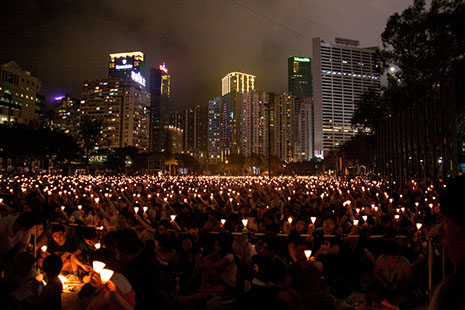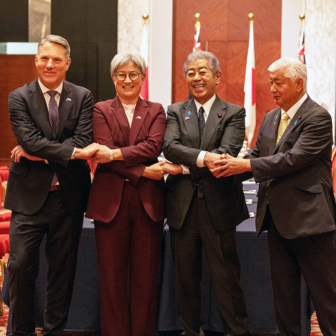ON THE evening of 4 June, tens of thousands of people joined a candlelight vigil in Hong Kong’s Victoria Park to commemorate the twenty-second anniversary of the Tiananmen Square protests. Police put the number of those who attended at 77,000. Organisers claimed that there were more than 150,000 – the same number they cited last year. This year’s anniversary is of special significance because mainland and Hong Kong pro-democracy activists are reporting that Beijing has tightened its grip on dissidents. With Nobel Peace Prize–winning dissident Liu Xiaobo in jail and artist-activist Ai Weiwei in detention, the event has added poignancy.
Every year the organisers of the Hong Kong vigil hope that a good attendance will send two messages: one to mainland dissidents and activists, encouraging them to keep fighting for democratic development and human rights in mainland China, and the other to the communist regime, reminding it that its violent response to the Tiananmen Square protests has not been forgotten. Lee Cheuk-yan, chairman of the Hong Kong Alliance in Support of Patriotic Democratic Movements in China, says the massive turnout has shown that the people of Hong Kong still want to fight for democracy in China.
At the vigil, some students write the Chinese word for “democracy” in chalk on the concrete ground of Victoria Park. Another message, next to pictures of Ai Weiwei, reads: “Vindicate June 4.” Jasmine flowers are pinned to backpacks in reference to the recent revolutions in Tunisia and Egypt.
A young Chinese girl helps to distribute white candles and paper cuffs. Many people from Hong Kong appear surprised when she addresses them in Mandarin rather than Cantonese, for most of the volunteers are locals. The girl, whom I’ll call Lili, is a student from mainland China and attending the vigil for the first time. “It’s amazing,” she says. “My job is to distribute candles, and so many people want to hold a candle and give money to support the Alliance to continue this event in Hong Kong. That is important because this is the only place in the territory of China where such a commemoration can be held.”
THE Tiananmen Square demonstrations were sparked by the death on 15 April 1989 of reformist Communist Party leader Hu Yaobang, who was considered to be leading China towards liberalisation in the post-Mao years. Against a backdrop of political turmoil, as communist governments fell across central and eastern Europe, many Chinese people mourned not only Hu’s death at the age of seventy-three, but also the loss of his commitment to reform. During April, several thousand college and university students gathered to mourn in Tiananmen Square, in the centre of Beijing. In mid May several hundred of the students went on hunger strike, calling for direct dialogue with Communist Party leaders about reforms and a more democratic government. Quickly the protests spread, involving hundreds of thousands of students, workers and residents of Beijing and other major cities in China.
To respond to the growing unrest, the Chinese government called troops into Beijing and on 20 May imposed martial law. Then, on the night of 3 June and into the dawn of 4 June, tanks rolled into the city and troops marched on Tiananmen Square. Soldiers opened fire on the crowds of people who surged onto the streets, and on the protesters who refused to leave the square. Thousands of unarmed civilians were reported injured and killed; the exact figure remains unknown. Democracy activists in China and Hong Kong have called for a proper account of what happened and for an investigation into the number of people who died.
China’s Communist Party considered the Tiananmen Square protest a social uprising and a counter-revolutionary activity. The students’ movement was labelled “disloyal” and “unpatriotic.” The Party meted out long prison terms and death sentences to “rioters” and others who had resisted the army. The authorities imposed strict press controls and tried to erase the memory of 4 June.
TWENTY-TWO years have passed since the suppression of the Tiananmen Square protests. Born in 1985, Lili is too young to remember what happened, and no one in her family, on a farm in the mountains of Wuyi Shan, ever spoke at length about the events.
In mainland China, any public commemoration of 4 June 1989 is banned, so Lili has never come across pro-democracy graffiti in memory of the protests. “The first time I got to know about the events of 4 June 1989 was in junior high school; I was about fifteen,” she remembers. Her high-school history book described the events in one short paragraph – in less than one hundred words the student protest was characterised as a “political disturbance” and marked as a negative consequence of Deng Xiaoping’s reform policy opening China towards the West and introducing a socialist market economy.
“I really wanted to know more and asked my teacher, who was very old and experienced. He said that he remembered this ‘political disturbance’ very clearly, but that he could not talk to me about it because it was too sensitive.”
Before her final exam Lili asked her teacher again about the 4 June events. “My teacher just asked me to let it go – it wouldn’t appear in our university entrance exam. Anything the government encourages us to know is in our exam. If it is in our exam, we are strongly encouraged to recite it. Anything that doesn’t appear in that exam isn’t important and we should not pay any attention to it. During that time I always thought that no teacher would ever lie to me; they would tell me everything they know.”
Lili explains that the Tiananmen protests were mentioned in her history class – albeit very briefly – because the communist regime could not completely deny that the protests had happened. “It was such a big and serious movement, the international pressure would have been too big to completely deny it. Instead the regime decided to play it down and to let it slowly die away.”
But despite all efforts to forget them, the events of 4 June 1989 still influence the behaviour of China’s rulers and opposition alike. The nervousness with which communist leaders approach the Tiananmen anniversary shows that the Party remains haunted by it. What if the party changed its policy of not commemorating the Tiananmen Square protests? “I would think that I was lied to for so many years,” says Lili. “And maybe not just about this event. I would realise that my freedoms, my right for information, are not complete. I think people will realise they need more information, they need the truth. When it is about 4 June, people will know that twenty years ago students were fighting for democracy and against corruption. But the situation in the country is the same today, it is even worse now. They might start to think, we can do this too, we have the same reasons to fight.”
THE silencing of memories of the Tiananmen protests is challenged by the wealth of information available to the expanding community of internet users in China. Their number has grown exponentially, from 20 million in 2001 to over 400 million in 2010. “The internet is becoming more and more common in China,” explains Lili. “Of course there will be reports of the June 4 vigil in Hong Kong available. Many people in China can get this kind of information from the internet.”
To combat access to external information, the Chinese authorities use keyword filtering, site blocking and other means of monitoring to prevent internet users from accessing material that the authorities deem undesirable. China blocks countless websites as part of a filtering system that critics call the “Great Firewall.” Websites such as YouTube, Facebook and Flickr are blocked. The authorities have closed blogs and censored home pages of human rights advocacy groups and some foreign news sites. Ahead of 4 June, internet censorship and the monitoring of dissidents are stepped up. In the wake of the revolts in the Middle East and North Africa the Chinese government tightened its grip on electronic communication.
However, as political control of the internet becomes more sophisticated, so do forms of resistance. Chinese internet users have developed methods of dealing with internet control. Some run multiple blogs or use overseas servers to host their sites. Several popular virtual private network services are designed to evade the government’s computerised censors. Popular programs such as Freegate circumvent internet filtering. The program encrypts users’ communication and routes it through IP addresses abroad, granting access to websites blocked in China.
China’s growing community of bloggers, online commentators and human rights defenders plays a prominent role in uncovering official corruption, exposing rights abuses and mobilising citizens to protest against censorship. More and more of Lili’s friends and former classmates are trying to break through the wall and share their experience. “If I have a friend who has experience of breaking this wall and getting more information, then he will tell me about all the information I don’t have. If that is all new to me, I would think, oh really? I have to try this too.”
IN HONG KONG, the public commemoration of 4 June is possible because of the former British colony’s privileged status under China’s policy of “one country, two systems.” The Basic Law, the constitutional document under which the Hong Kong Special Administrative Region has continued to protect its capitalist system, protects certain freedoms of its residents. These include, among others, the freedom of assembly, the freedom of speech and the freedom of the press.
The growing number of Chinese mainlanders making the annual pilgrimage to Victoria Park for the 4 June candlelight vigil in Hong Kong is hard to quantify. More than 87 per cent of non-local student enrolments in Hong Kong’s universities are from China. In 2010 a record 22.7 million mainland Chinese visited Hong Kong. This year the 4 June commemoration fell on a Saturday, when many mainlanders come to Hong Kong for a weekend shopping trip. But numbers tell just part of the story. As Lili says, “Mainland Chinese students like me who come to study in Hong Kong, and travellers, they go back to China and they will talk about their experience with their friends. And maybe their friends will come here next year and more and more people will be informed about the June 4 events.”
Lili’s new perception of the Tiananmen protests has changed her attitude towards the Party. “I am a Party member and first I thought that all about the Party is good. The secretary of our Party branch told us to spread the word among other students, to make them believe in their leadership, to serve the CCP and their country.” When she goes back to China she will take the pamphlets from the Hong Kong vigil with her. She thinks it is important for the people on the mainland to know. •




